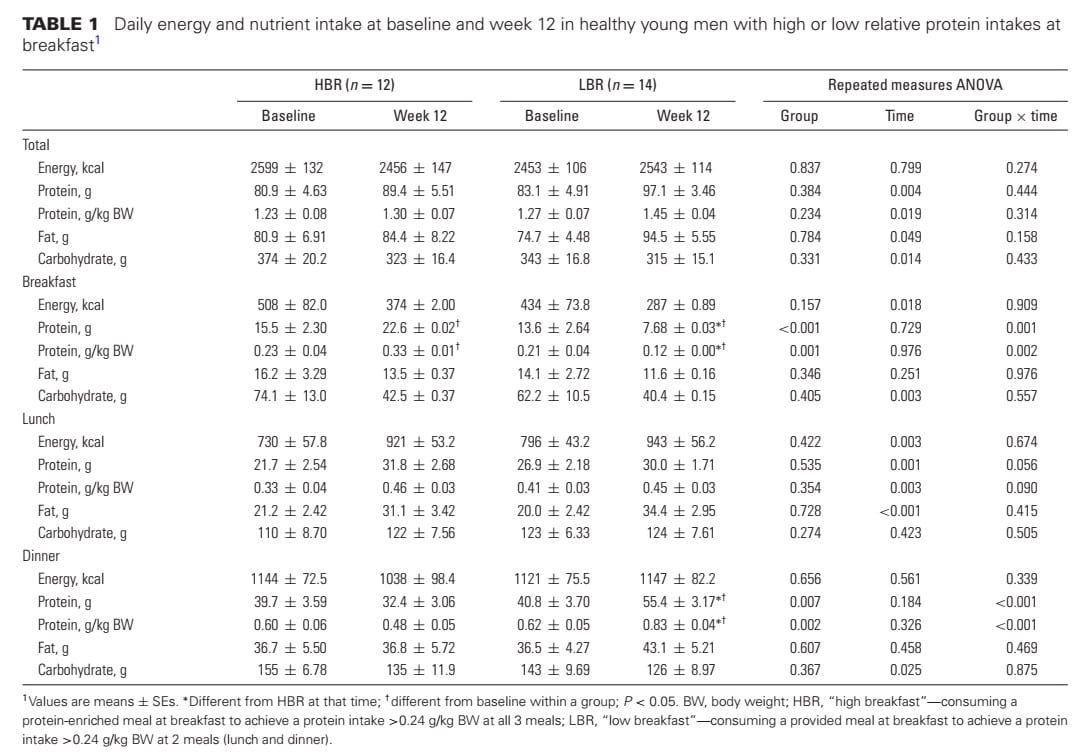New study: A more even protein distribution can improve your gains
According to the hardcore IIFMY crowd, things like nutrient timing don’t matter for your gains. They say only your total daily macronutrient intake affects your body composition change and strength development over time. Very few evidence-based professionals agree with this point of view and a new study from Japan adds to the dozen or so studies that find nutrient timing does in fact matter for those seeking maximum muscle growth.
A team of Japanese researchers led by
In short, the study compared an even vs. a skewed protein distribution with the same total macronutrient and calorie intakes in each group.

After 12 weeks, there was a strong trend for better gains in the group with the even protein distribution. They gained 2.5 kg lean body mass compared to 1.8 kg in the skewed protein group (p = 0.06) and they improved their 1RMs more (p = 0.1). See the full data below if you’re interested.
The greater gains were likely the result of the protein distribution, not a difference in total protein or energy intake, because the skewed protein distribution group self-reported consuming non-significantly more protein. They also gained non-significantly more fat, making it unlikely the even protein distribution group was simply consuming more calories.


What explains these results? Multiple earlier studies have compared even vs. skewed protein distributions, though mostly in sedentary individuals. Most studies found no effect of the protein distribution, but some did: a more even protein distribution has been found to improve total daily protein synthesis.
There is also mixed evidence that very small meals don’t cross the ‘leucine threshold’ required to trigger a robust increase in muscle protein synthesis.
Since the body cannot store protein as effectively as it can store carbs as glycogen or fat fat as adipose tissue, the body can only compensate for these ‘missed gains’ to a limited extent. High protein servings trigger a ‘muscle full’ effect: there’s a maximum amount of protein synthesis you can stimulate in 1 meal, especially outside of the anabolic window, which delays the muscle-full effect.
Based on these findings, consuming only 1 or 2 meals a day will likely not optimize total daily protein balance and this study indicates that adding a snack may still not suffice for maximum gains. You probably need 3 protein servings above the leucine threshold of ~0.3 g/kg protein, roughly over 20 g high-quality protein per meal. Click here to read my more detailed article on the effect of meal frequency on protein balance.
A notable limitation of the study is that the subjects could do their workouts in either the morning or evening class, so it was unclear how the protein distribution in each group matched with their anabolic windows.
In conclusion, this study adds to the evidence that you probably need to consume a minimum of 3 meals a day with at least 0.3 g/kg protein in each meal for maximum muscle growth.
Study reference
Evenly Distributed Protein Intake Over 3 Meals Augments Resistance Exercise-Induced Muscle Hypertrophy in Healthy Young Men. J Nutr.2020 Apr 22;nxaa101. doi: 10.1093/jn/nxaa101
 Want more content like this?
Want more content like this?
Then get our free mini-course on muscle building, fat loss and strength.
By filling in your details you consent with our privacy policy and the way we handle your personal data.
